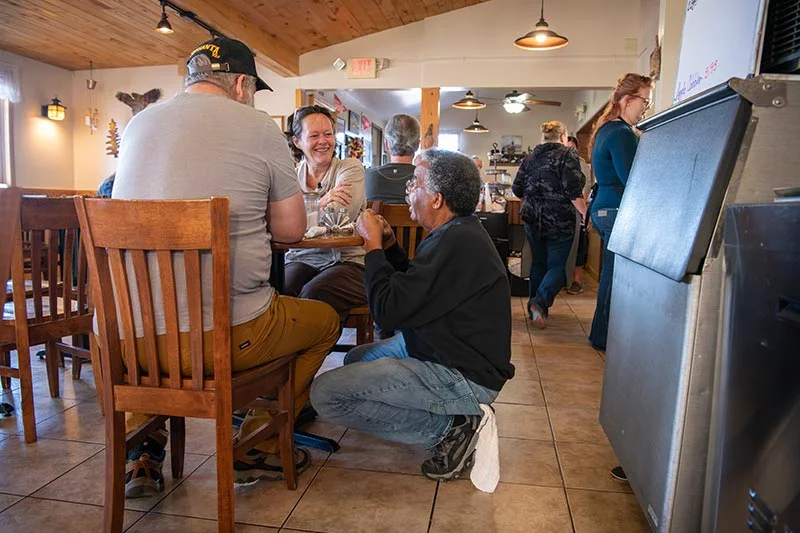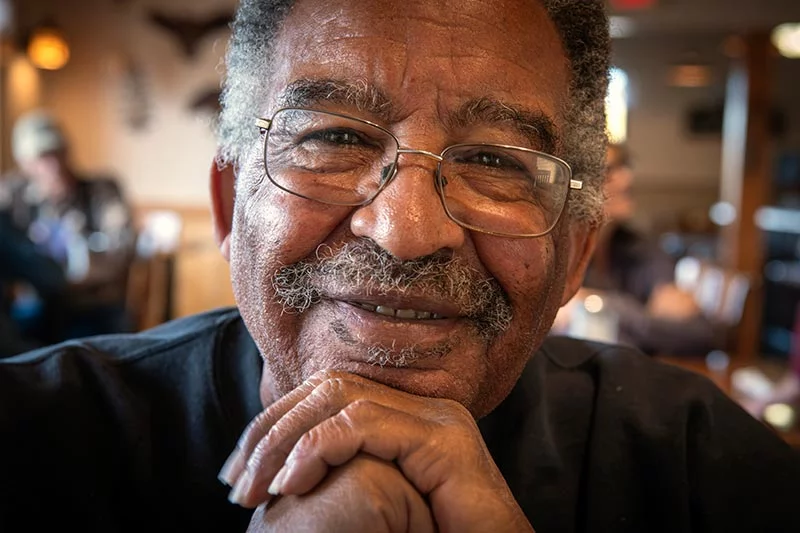
An emergency room doctor delivered the news back in 2023 that Willie Quinney and his wife, Cheryl Jenkins, had been dreading: Willie’s kidneys were no longer working.
Willie had been successfully handling high blood pressure and chronic kidney disease for more than two decades, knowing that his kidneys were likely to give out at some point. But the doctor’s news on that September day two years ago was still a shock. And besides, Willie and Cheryl had been focused on her recent diagnosis of acute lymphocytic leukemia.
Willie would need emergency dialysis and ultimately, a kidney transplant. Silence hung in the air in the ER examination room after the doctor finished speaking.
Willie started to weep, and so did Cheryl.
“We were devastated, just devastated,” Cheryl said.
Christy Morrell, Cheryl’s daughter, was sitting in the ER waiting room when a nurse told her to go back to the exam room to see her mother and Willie. She knew it couldn’t be good news.
“I was standing there looking at Willie’s face,” Christy said. “It was an absolute shock. My mom started crying. Willie was crying. I said, ‘We are going to find you a kidney. I’ll start tonight.’ And that’s what I did.”
The family members could not have known in that fraught moment in a hospital ER that their journey to find Willie a kidney would lead them around the world and ultimately right back to the small southern Colorado community where they had lived for more than a decade. It would be there, in the breathtaking Wet Mountain Valley, that Willie’s kidney donor would eventually come forward and change his life.
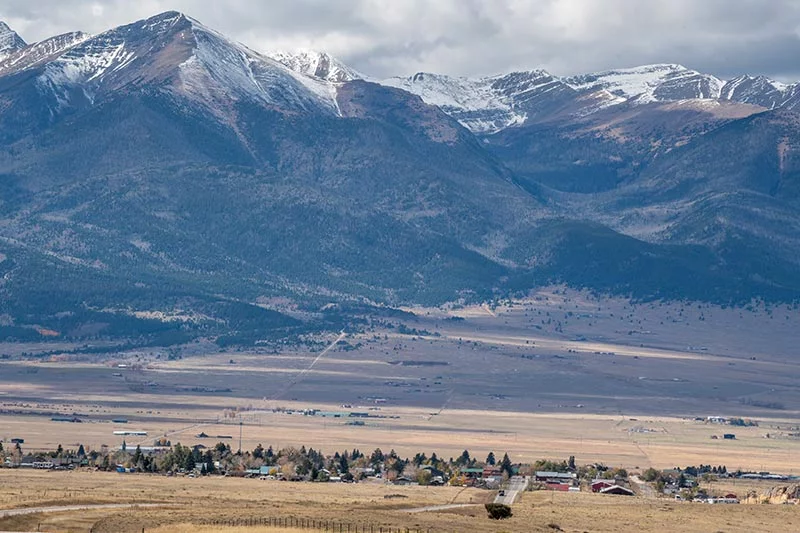
From Kansas to Colorado, a family builds a beloved local diner
Living in Silver Cliff, population 700, wasn’t part of Willie and Cheryl’s life plan. They had just finished building Cheryl’s dream home on a golf course in Independence, Missouri.
But those plans changed in 2011, when they were in Silver Cliff visiting Christy and her husband, Greg, who had moved there in 2005. As the visit drew to a close, Christy and her parents drove past a boarded-up restaurant and six-room motel in town with a “For Sale” sign out front.
Christy joked that Willie and her mother should buy the place and move to Colorado. After they headed back to Missouri, Christy got a phone call from her mother. She and Willie had made an offer on the motel, and the seller accepted.
“My mom said, ‘What am I going to do? Now I have a restaurant!’” Christy said.
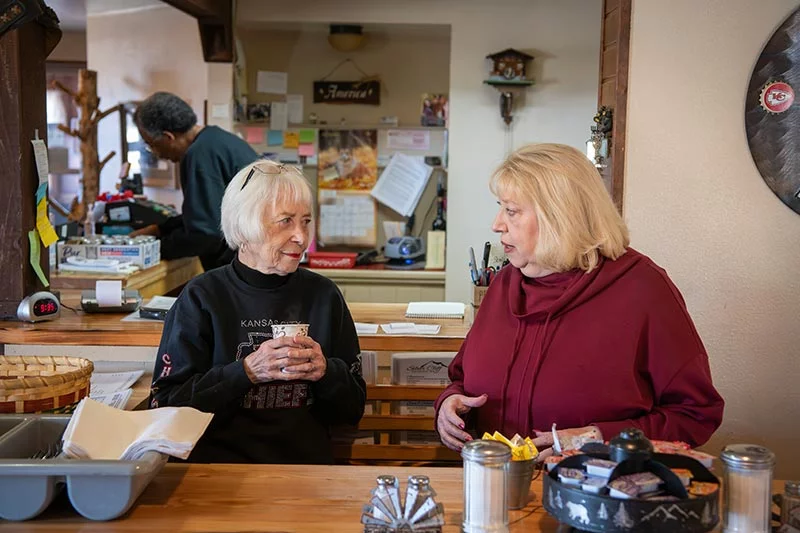
Willie and Cheryl initially planned to reopen the motel but decided instead to remodel the shuttered restaurant because, as Willie put it, there was nowhere he liked to eat breakfast in town. The project took nearly a year.
Willie and Cheryl sold their Missouri dream home, moved into the two-bedroom apartment behind the motel and opened the Silver Cliff Mountain Inn on the day after Thanksgiving in 2012.
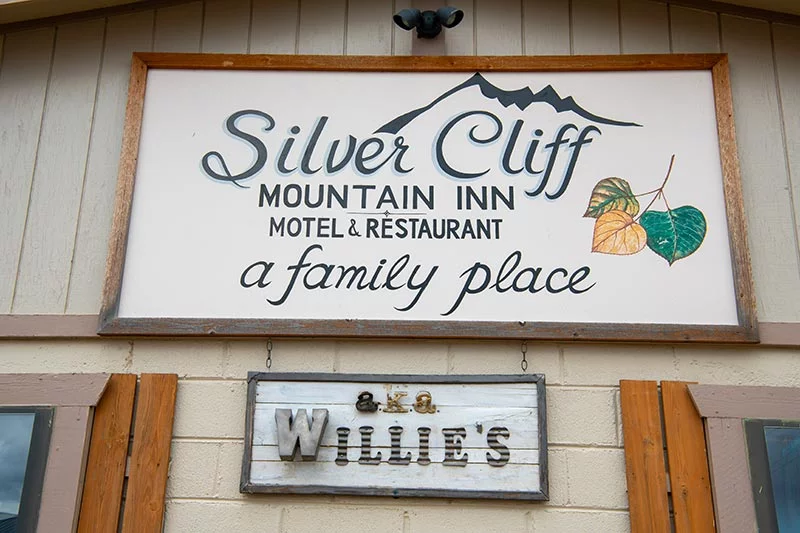
If Cheryl was overwhelmed by the prospect of opening a restaurant, Christy was undaunted. She had operated two eateries in nearby Westcliffe from 2006 to 2010 before closing them when she and her husband adopted their daughter. And Willie was a good cook.
These days, the restaurant is a fixture in the community, with Willie and Cheryl at the center of the action. Beneath the Silver Cliff Mountain Inn sign outside the restaurant, a smaller sign reads “AKA Willie’s.” Inside, an inscription on the coffee mugs tells another story: “Mostly Cheryl’s Place.”
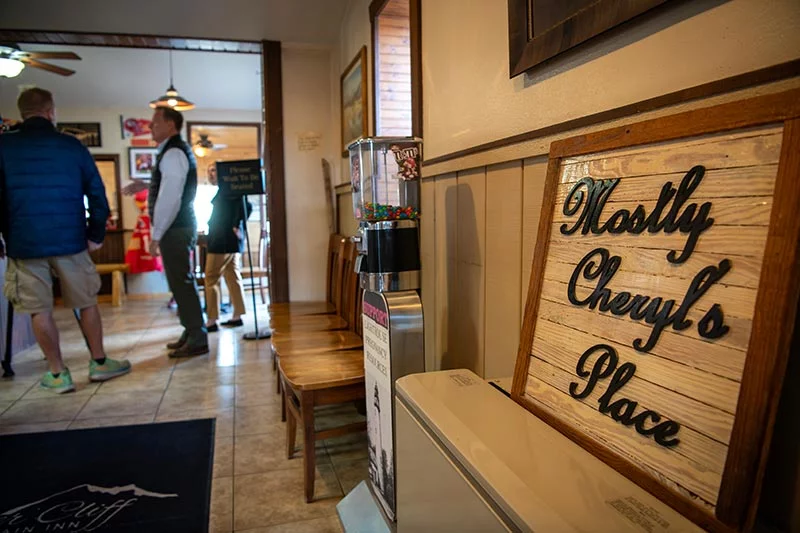
If you stop in for a bite to eat, you’re likely to find Cheryl behind the register and Willie working the dining room with a pot of fresh coffee and a dish towel hanging from his back pocket. The aroma of syrup, coffee and bacon greets customers at the front screen door. The call of “order up” from the kitchen rings out every few minutes until the morning rush slows. Servers know the locals by name as they deliver heaping plates of biscuits and gravy, corned beef hash and breakfast burritos smothered in green chile. Out-of-town visitors get the same friendly service, and on a recent morning, long-time friends of Willie and Cheryl’s surprised them with a visit. If you’re a Kansas City Chiefs fan, you’ll be fast friends with Willie and Cheryl, who keep a shrine to their football team near the register.
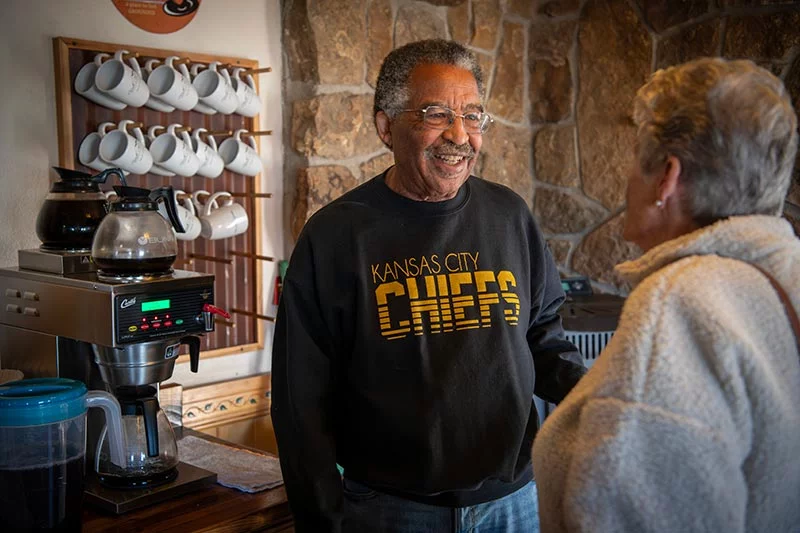
Stunning beauty and a rich history define the Wet Mountain Valley
There are no bad views through the windows of the Silver Cliff Mountain Inn. The Wet Mountain Valley is ringed by mountains — the 14,000-foot-plus peaks of the Sangre de Cristo range to the west and the sloping Wet Mountains to the east. Silver Cliff and neighboring Westcliffe, population 500, sit along Colorado Highway 96 before it turns into Main Street in Westcliffe and dead ends there, about 80 miles southwest of Colorado Springs, accessible only by meandering, two-lane roads.
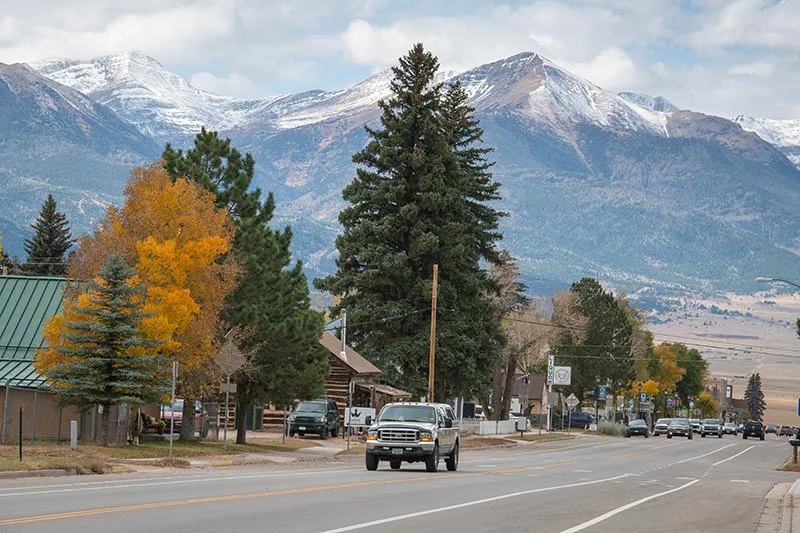
The Ute, Apache and Arapaho tribes called the valley home before farmers, ranchers and silver prospectors arrived in the late 1800s. Silver Cliff was Colorado’s third-largest city then, as miners flocked to the valley. But when the mining boom went bust, the population began to shrink. Business owners and those with homes put their buildings on rollers and moved them to nearby Westcliffe.
Today, descendants of some of those settlers remain, joined by retirees, outdoor enthusiasts, artists and others. In Westcliffe, art galleries, coffee shops, boutique motels and an outdoor gear shop line Main Street. The runs of the long-shuttered Conquistador Ski Area are still visible from town, carved into the mountainside.
Silver Cliff and Westcliffe, nicknamed “The Cliffs,” have been designated as an International Dark Sky Community. In Westcliffe, the Smoky Jack Observatory offers a schedule of sky-watching events from spring through fall. From a nearby bench, visitors can hear cattle lowing in the distance.
The day everything changed for the namesake of Willie’s Place
By the time summer was in full swing back in 2023, Willie was feeling a little off. He was exhausted and forgetful, and he noticed that his hands and legs were swollen.
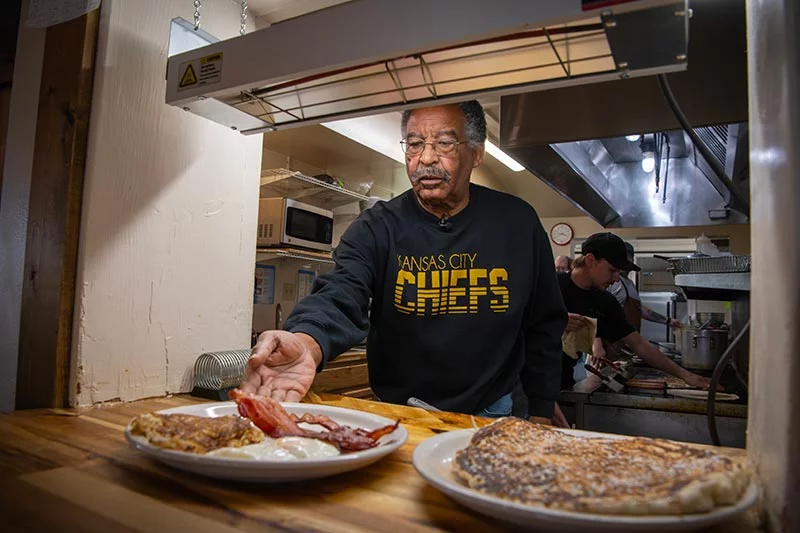
Doctors diagnosed Willie with high blood pressure and early-stage kidney disease in 1998. They told him that he’d eventually need dialysis — regular medical treatments that mimic the kidneys and remove toxins from the body — along with a new kidney someday. Willie wanted to delay that inevitability as long as possible. He went on medication to lower his blood pressure and completely changed his diet and lifestyle, enjoying more than 25 years of an active and healthy life.
But kidney disease eventually caught up with him. In the summer of 2023, Willie saw his doctor, who told him his kidneys were not working well and to prepare for dialysis within the next six to 12 months.
“I said, ‘I don’t want to do it,’” Willie said. “She said, ‘You’ll die.’ So I said, ‘Maybe I’ll do it.’”
The doctor’s prediction was correct, but her timeline was a little off. Just one month later, Willie’s health was deteriorating. One morning, he couldn’t stand up from the chair where he was sitting. Cheryl and Christy begged him to go to the ER, but he refused and said he needed to get over to the restaurant. Christy did the only thing she knew would persuade Willie to see a doctor. She called her husband, hoping Willie would listen to him.
Greg drove over to Willie and Cheryl’s apartment, took one look at Willie and drove him to a hospital in Colorado Springs.
Doctors ran a battery of tests. Then, the ER doctor delivered the news: Willie would be admitted to the hospital and begin dialysis immediately. Had he delayed even a few hours in going to the ER, he could have died.
Dialysis would keep Willie alive, but without a kidney transplant, he would face a lifetime of treatments.
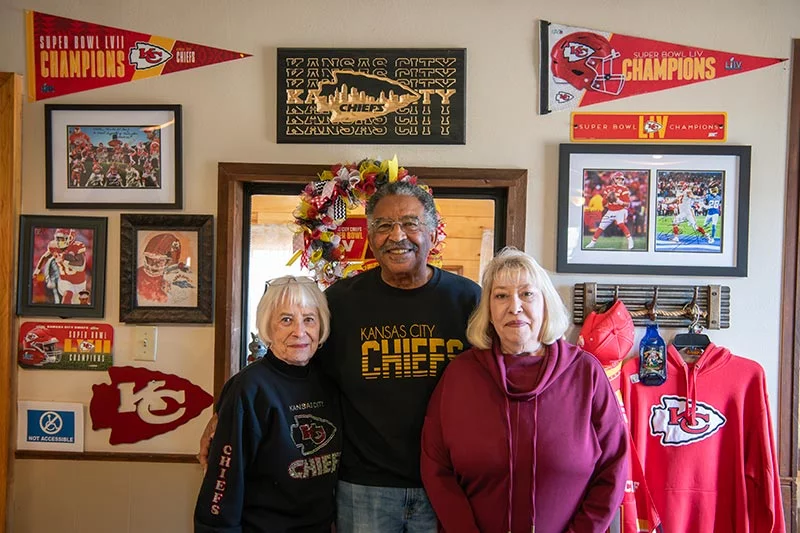
Hope begins with a promise
As Christy listened to the ER doctor talk with her parents, she did the only thing she knew would help.
“I had to give them some hope,” she said. “I had no idea what would be involved. In that moment, all I could see was my mom was melting down, and so was Willie.”
When she got home to Westcliffe, Christy called a family friend, Katie Johnson, and told her she needed to figure out how to raise money for a kidney transplant for Willie. Johnson and her husband, Ted, joined the effort. Christy then called another friend, and another, asking for help.
Christy started the “We’re Team Willie” Facebook page on Oct. 27, 2023. She knew they would need to find a living donor for Willie, and expected they might need to raise some money to help with travel expenses for dialysis. Johnson’s husband, Ted, then created the web page and QR code that housed information about Willie and their quest for a kidney.
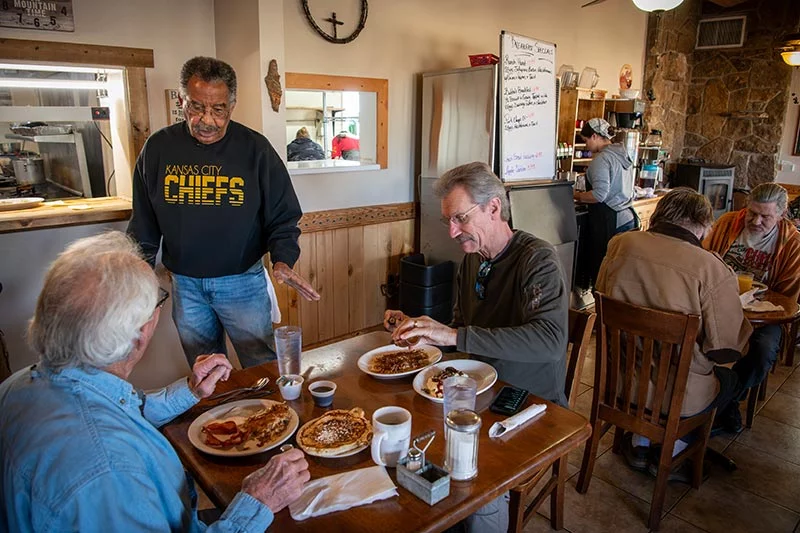
“Our hope is that there is someone out there in this big ‘ol world who is a match and will generously consider donation of a healthy kidney so that Willie can continue to change the world, one person, one smile, one good deed at a time as he has always done. Someone who will know that Willie has spent his life giving and still has so much left to give. He just needs a little help in getting his body to cooperate with the plans his heart has.”
Learn how you can help save a life by donating a kidney or part of your liver through UCHealth’s Living Donor program. Kidney donors must be: Patients whose kidneys have failed can receive a kidney transplant from a deceased organ donor or from a living donor. The average wait for kidney transplant is two to seven years, sometimes longer, according to the National Kidney Foundation. Willie worried about his age, then 72. “I figured there was no way they would give up a kidney to someone this old,” he said. Christy worried that Willie wouldn’t live long enough to get a transplant. But before long, five people had signed up to be tested as potential donors. Meanwhile, the We’re Team Willie page took off. Loree Lund, a Westcliffe resident and businesswoman, received an invitation to follow the page. She had lived in Westcliffe with her husband, Chris, since 2015, running the small manufacturing business started by her father in Greeley in the 1980s. The business, called Take A Look Active, sells rear view mirrors that bicyclists attach to their helmets. Loree, 60, knew of Willie and Cheryl and had been to their restaurant a few times but didn’t know them well. She donated to the fundraising efforts. But signing up to be tested as a donor? She didn’t give it much thought, at first. After Willie left the hospital in September 2023, he returned to Silver Cliff. But the life he and Cheryl had built there changed dramatically. To stay alive, Willie would need dialysis three times a week. There are two types of dialysis: peritoneal dialysis, which uses the inner lining of a patient’s abdomen to filter blood, and hemodialysis, which is more common and uses a dialysis machine to remove toxins from the bloodstream. Willie tried peritoneal dialysis for a few weeks but had to switch to hemodialysis through a port implanted in his chest. Dialysis can be lifesaving, but it’s far from easy. “It takes a huge toll on someone, both physically and emotionally,” said Dr. James Cooper, a transplant nephrologist and medical director of kidney transplants at the UCHealth Transplant Center on the Anschutz Medical Campus. While the availability of dialysis in the U.S. is something many countries can’t offer, it’s still a difficult path, and often the only alternative to death for patients with kidney failure. Dialysis is linked to high rates of cardiovascular complications, including heart attacks and strokes, and it significantly affects a patient’s quality of life. For patients undergoing hemodialysis, the routine of traveling to a dialysis center three times a week can be exhausting and disruptive, said Cooper, who is also a professor of renal diseases and hypertension at the University of Colorado School of Medicine. Willie drove himself to dialysis each time, traveling about two hours from Silver Cliff to a dialysis center in Colorado Springs, then back home again. During his first treatment, Willie took stock of the scene at the dialysis center. He noticed the younger people receiving dialysis and the patients who came by wheelchair or walker. He vowed that he would remain upbeat and grateful for the people working at the center. He often wore a Chiefs hat or a beanie knitted or crocheted by friends or members of We’re Team Willie. “Once I accepted it, I thought, I have a job to do here,” he said. When he wasn’t in dialysis, Willie continued to work in the restaurant, rarely missing a day. By December 2023, Willie was undergoing testing at UCHealth University of Colorado Hospital to secure a spot on the transplant list. He was approved in March 2024. As Willie settled into a dialysis routine, Christy and the We’re Team Willie volunteers ramped up their efforts with a series of creative fundraising ideas. They announced the first on Nov. 3, 2023, a “Free Willie (from medical and travel expenses)” raffle, with tickets starting at $1. There was a bake sale, a pie-throwing contest featuring local volunteers, a BBQ fundraiser and a silent auction with a jersey of Patrick Mahomes, the star Chiefs quarterback. Willie’s quiet generosity is well known in Silver Cliff. He’s delivered meals to veterans and older neighbors and once served meals to a homeless man until he could pay his own way. One time, Cheryl was in line at a local dollar store, and a woman told Cheryl how much she had appreciated Willie’s help. “I had no idea what she was talking about,” Cheryl said. “She said, ‘Oh, I didn’t have enough to pay for groceries for myself and my kids. So Willie paid.’” “Willie is a beloved character here in town,” Cheryl said. “And he is a character!” Willie and Cheryl regularly offered their restaurant to others in town who needed to raise money: a local dance group that was headed to a competition, a school class planning a trip to Washington, D.C., to name a couple. For years, they hosted a free Thanksgiving dinner, and one time when the local sheriff came into the restaurant, Cheryl asked him what the department needed. When he said they would like a dog trained in identifying illegal drugs, Cheryl and Willie helped raise money for the new canine deputy. Now, community members focused their generosity on Willie and Cheryl. Christy encouraged people to consider becoming kidney donors. But that list of five potential donors soon shrank to four, then three, as potential donors were disqualified for medical reasons. By May 2024, Christy learned that a potential donor they thought was a perfect match was denied at the last step. “We were all so sure, and now we’re back to square one,” Christy wrote on the Facebook page. Loree followed Willie’s journey. She considers herself “not a scientist but interested in science.” She had volunteered previously for a couple of research studies at the University of Colorado School of Medicine. In December 2023, she hovered over one of the links Christy posted about kidney donation. “I clicked on the link out of curiosity and started filling out the form,” Loree said. After she provided her name and contact information, the questions became more detailed. One asked if she was serious about organ donation or just curious. “I thought, ‘Huh, I guess I should think about that for a minute.” She did a little research online and learned that donating a kidney “wouldn’t be that big of a deal,” she said. Before she proceeded, she needed to talk with her husband. He thought the odds were slim that his wife would be matched with Willie and saw no problem if she signed up to be tested. Loree began testing in May 2024 at the Transplant Center in Aurora. The center assigned Loree her own kidney transplant coordinator, and Loree met with a social worker to ensure that she didn’t feel coerced into donating. Doctors ordered a series of blood tests and scans to check her health. When she received calls about additional tests or had to answer more questions about her health, she sometimes felt like quitting. Then she would remind herself that she wasn’t doing this for herself. She was doing it for Willie. Kidneys from living donors offer key advantages including a faster path to recovery, said Cooper, the UCHealth transplant nephrologist. Once matched with a living donor, patients bypass long waiting lists for kidneys from deceased donors and can schedule surgeries as soon as possible. “The quicker you can get a transplant, the better,” Cooper said. Kidneys from living donors also typically last longer, function better and lead to fewer complications than kidneys from deceased donors, he said. Potential donors go through complete medical assessments to ensure they are healthy enough to donate a kidney. The recipient’s insurance covers the donor’s medical costs, and grants can help pay for incidental expenses, like travel. For healthy donors, the short- and long-term risks of kidney donation are minimal. Donors don’t need to take any medications over the long term, have no restrictions on activities after recovering from surgery and have a very low risk of future kidney disease. “Willie is a wonderful example of what kind of amazing good can come out of a selfless act like donating a kidney,” Cooper said. “It truly is a gift of life.” Spring turned to summer. When Loree saw that there was little good news about Willie, she would send an update to Christy about where things stood with her testing. In October 2024, Christy posted that all but one of the additional potential donors had been disqualified. “We have ONE potential donor who is mid-way through their testing and could possibly be found to be a good match,” she wrote. That person was Loree. Then, in November 2024, more than a year after Willie’s kidneys failed, Loree got the call that she had been cleared to be a kidney donor for Willie. “I was so relieved,” she said. “It was like finishing a marathon. It was such a relief that I made it all the way through.” Loree messaged Christy to share the great news. Christy never imagined that a donor would come from their Wet Mountain Valley community. They assumed the right person would step up from somewhere far away in the “big ol’ world,” maybe someone from the Kansas City area or someone who knew Willie and Cheryl from work or school. Yet, here was Loree, practically a neighbor. The women decided to tell Willie and Cheryl together by phone. “The first thing I said is, ‘Are you sure you want to do this?’ And she said yes,” Willie recalled. Christy then shared the great news with We’re Team Willie fans. “Our gratitude today for Willie’s donor is so huge that we’re not sure there’s a word we can use to describe it, nor enough thank yous to give. “Thank you for giving Willie his life back. Thank you for being the person to allow him to continue to be a husband, dad, grandpa, brother, uncle, neighbor and friend. Thank you for caring so much and giving so much.” After 17 months of dialysis treatment, Willie was about to get a new kidney. As Christmas 2024 approached, Willie and his family waited to hear when he would be able to have his transplant. They assumed they wouldn’t hear until the new year. But on Dec. 23, 2024, the transplant team let Willie and Loree know that the surgery would take place on Feb. 19. As the days crept closer to Feb. 19, Christy launched a contest at Willie’s request to name the kidney Loree would be donating – her left one – to win a free breakfast or lunch from the restaurant. Billy the Kid(ney) was the winner. The night before the transplant, Loree and Chris had dinner with Willie and Cheryl and Willie’s family at an Italian restaurant in Denver. Willie presented Loree with a necklace he had had made for her, with a pendant in the subtle shape of a kidney. The transplant surgery went well, and Willie’s new kidney began producing urine almost immediately. “It changed my life,” said Willie. Loree stayed one night in the hospital and had to stay in Denver near the hospital for a week. She said the surgery and her recovery both went well. She downplays her choice. “I hate it when people tell me I’m a hero,” she said. “It was not a hard thing to do, and I don’t want people to think you have to be a hero to do this. Everyone should go learn about donating a kidney. “For me, it was that this was the thing I could do to help,” she said. “Kindness is the thing I have to give.” Willie and Cheryl are making sure they pass along the many gifts that buoyed them for months. Willie and Cheryl are creating a nonprofit organization called Team Willie 4 Custer County that will direct the remaining money from fundraisers to Custer County residents who are facing kidney disease. They’re planning to raise additional money for other patients. In late October, Willie, Cheryl and other Team Willie supporters hosted a free gratitude dinner for the community. “There wasn’t a person in this community who didn’t help,” Cheryl said. “Some gave hugs, some gave 50 cents, some said they would keep us in their prayers. Every bit of it meant something.” Willie and Cheryl served Willie’s specialty: Kansas City brisket, pulled pork and pulled chicken sandwiches, along with potato salad, baked beans and chips. Willie’s two sons surprised their dad and flew in for the celebration. Willie and Cheryl had tokens of appreciation for the volunteers of We’re Team Willie and members of the restaurant team who helped with fundraising events. Willie still works every day at the restaurant. Sometimes he’s in the “dish pit.” Other days, he’s on the line cooking. Often, he works the dining room with a coffee pot in hand, stopping at each table to talk with customers. “We would have to tie him to a chair to keep him from working,” Cheryl said. As for Cheryl, her leukemia is under control, and she has responded well to treatment. On most Thursdays, Loree and Chris come in for breakfast. Willie hovers over their table, making sure their coffee is fresh, checking to see how Loree is doing. When Willie learned that Loree is a vegetarian, he started buying vegetarian sausage for her biscuits and gravy. At the community dinner last month, he made veggie burgers especially for Loree and Chris. Cooking vegetarian options for her is a small token of his gratitude for the priceless gift Loree gave him. “There are no words for it,” Willie said. “Absolutely no words for it. Every time I see her, I have to hug her. And I tell her, ‘You are never paying for another meal as long as I have this restaurant.’”
Local businesswoman starts her transplant journey
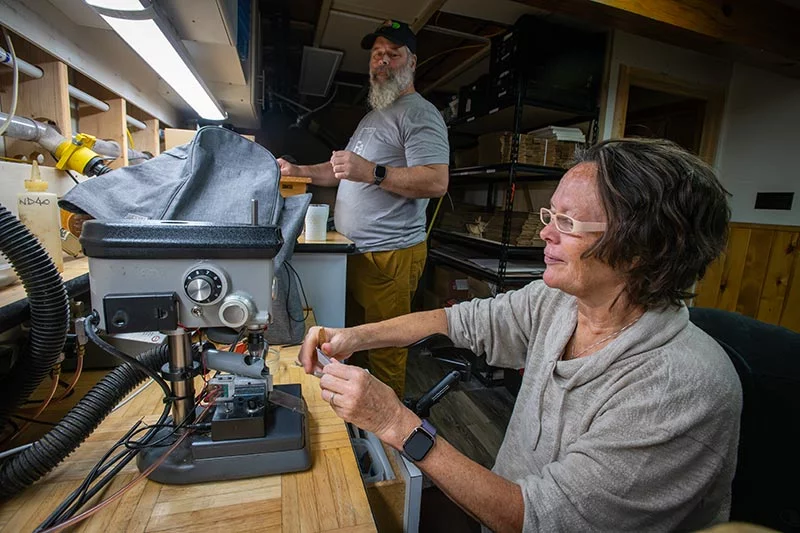
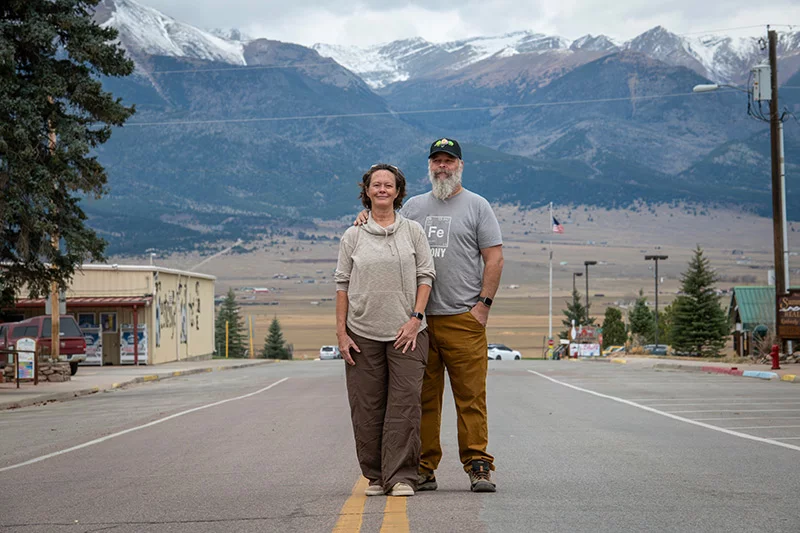
Meeting dialysis with determination – and a hat
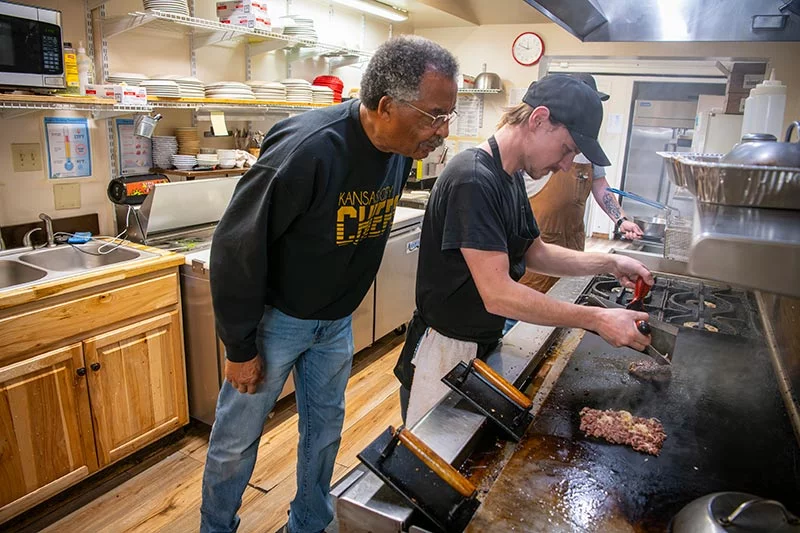
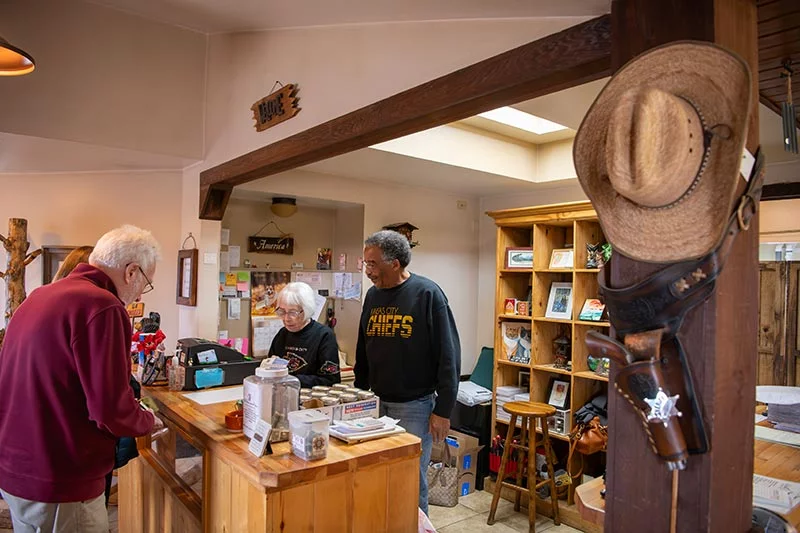
Community rallies around its ‘beloved character’
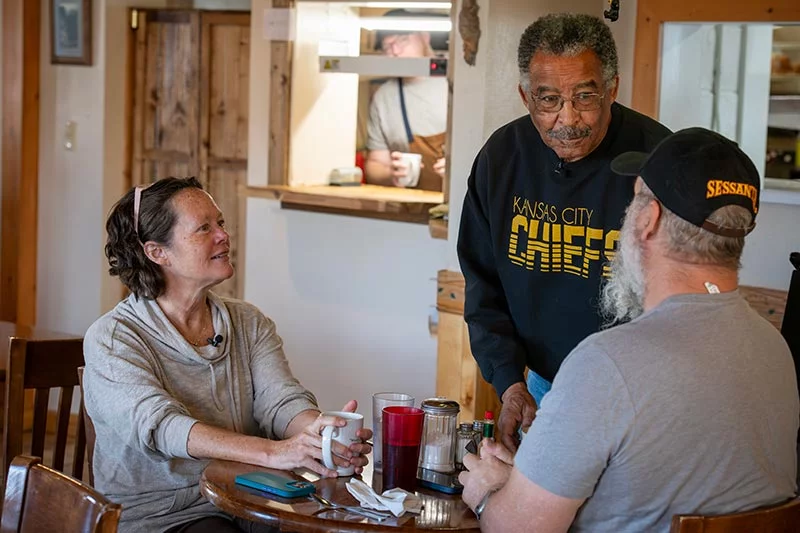
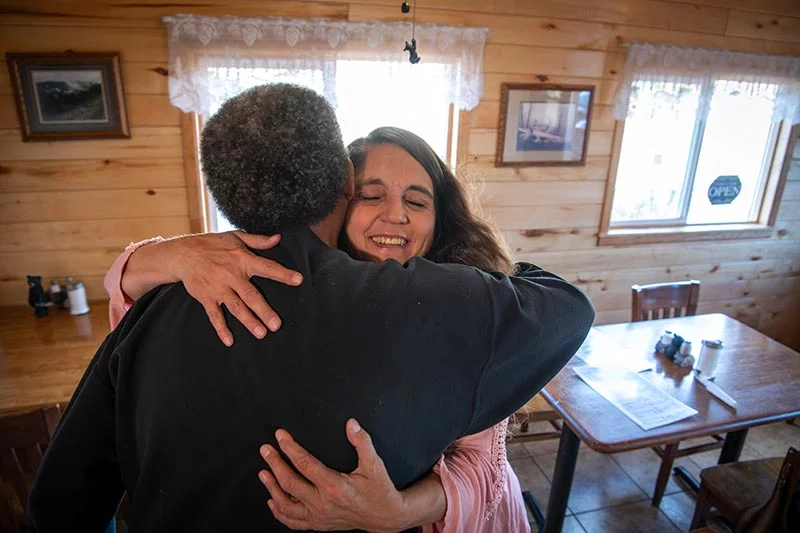
Curious or serious? A potential donor ponders the question
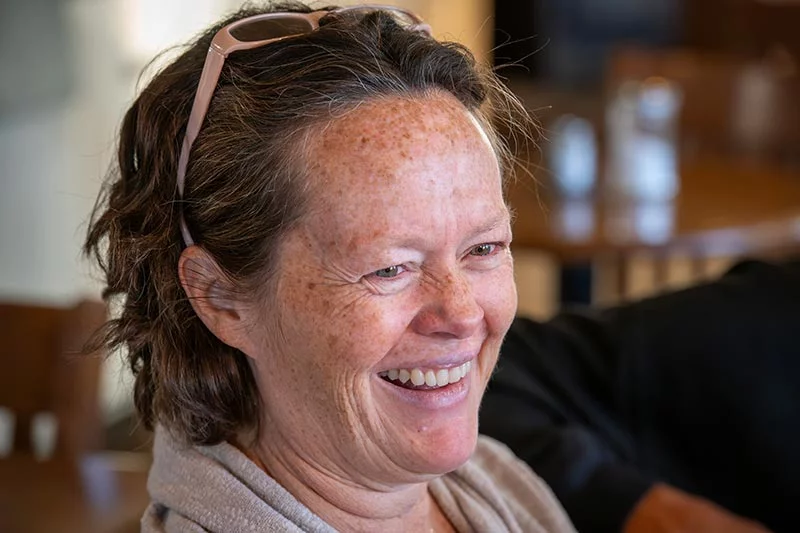
Team Willie update: Just ‘one potential donor’ remains
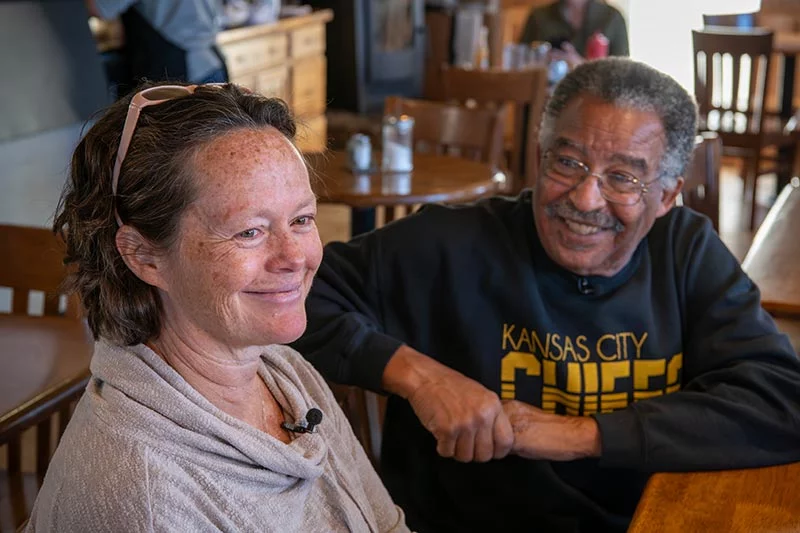
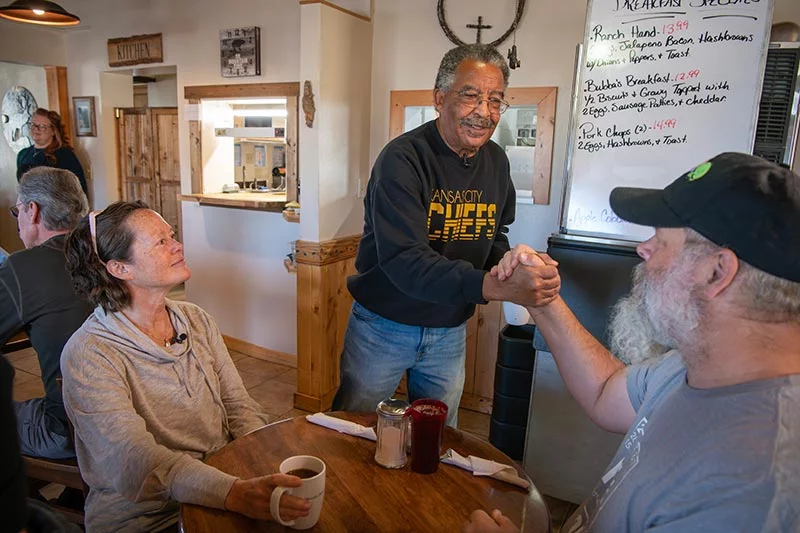
A date for Willie’s transplant surgery — finally
A humble kidney donor: ‘I hate it when people tell me I’m a hero’
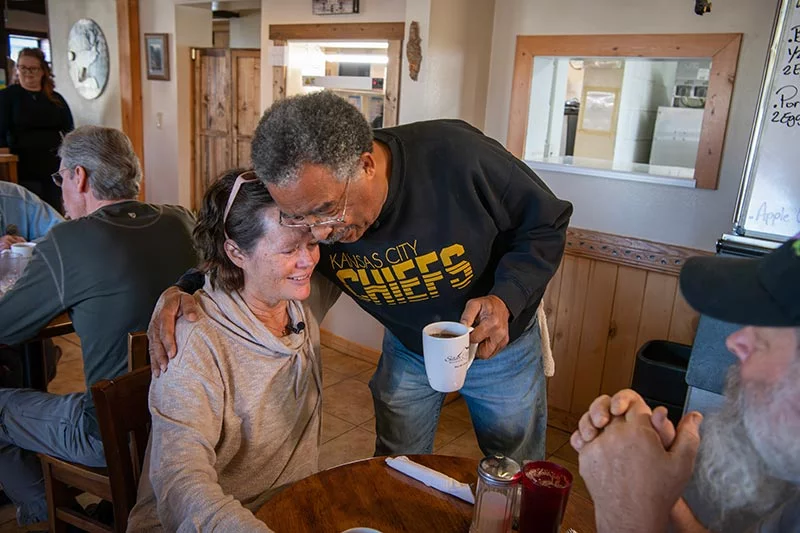
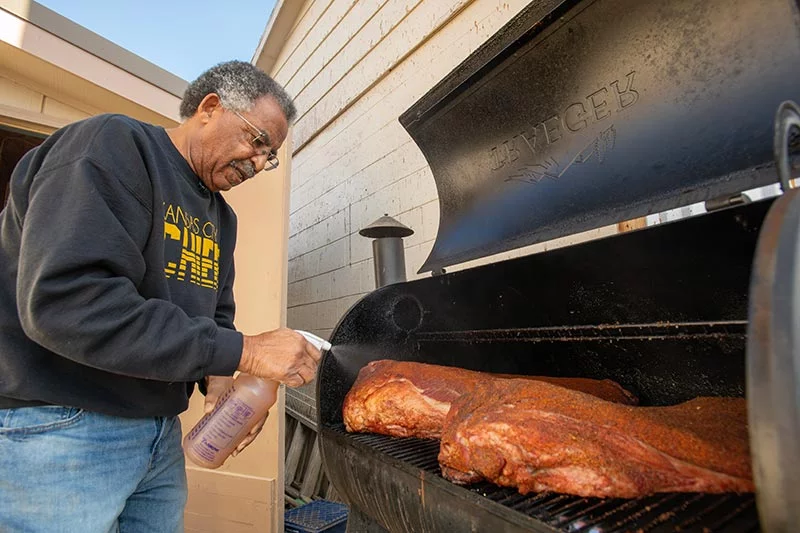
Thursday mornings at Willie’s Place
